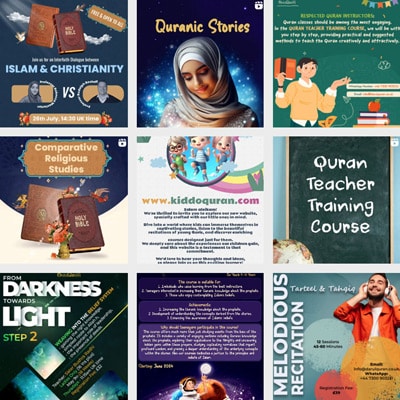Scholars are the torches of the earth, the prophets’ representatives, and heirs to me and the other prophets
Prophet Muhammad (S)
Table of Contents
ToggleThe concept of divine tests holds significant importance in various religious traditions including Islam.
in the tafsir of The Quran that is considered as the holy book of Islam provides insights into the notion of tests and their functions in the lives of individuals.
This essay aims to explore the concept of divine tests from the perspective of Quran highlighting their significance and functions. By examining relevant verses and interpretations this paper seeks to shed light on the role of tests in shaping a believer’s character faith and relationship with the divine.
Divine tests are an integral part of our existence, and understanding their functions is crucial for personal growth and spiritual development. The Noble Quran and Tafsir provide valuable insights into the purpose and significance of these tests. Divine tests serve as a means of purification. Just as gold is refined through fire, human beings are refined through trials and tribulations.
These tests allow us to recognize our weaknesses, develop resilience, and strengthen our faith in Allah. They enable us to grow spiritually and become better versions of ourselves. Divine tests serve as a means of differentiation.
Allah states in Quran that He created life and death to test which of His servants are best in deeds (Quran 67:2). These tests help distinguish between those who truly believe in Allah guidance and those who merely claim to do so. They separate the sincere from the insincere, allowing individuals to prove their devotion to Allah.
Furthermore, divine tests also serve as a means of reward. The Grand Quran assures believers that after every difficulty comes ease (Quran 94:5). By enduring trials with patience and gratitude, individuals can earn immense rewards from Allah both in this world and the hereafter.
Definition and Purpose of Divine Tests
The Holy Quran, the sacred scripture of Islam, is believed to be the word of Allah revealed to Prophet Muhammad (S). It serves as a guide for Muslims in all aspects of life.
One recurring theme in Quran is the concept of divine tests. These tests are defined as challenges or trials that individuals face in their lives.
The purpose of divine tests in the Sacred Quran is multifaceted. Firstly, they serve as a means for individuals to prove their faith and devotion to Allah. Through these trials, believers are given an opportunity to demonstrate their trust and reliance on Allah. It is through these tests that one’s true character and strength of faith are revealed.
Furthermore, divine tests also serve as a means for personal growth and development.
They provide individuals with opportunities to learn important life lessons such as patience, perseverance, and gratitude. By facing challenges head-on and overcoming them with faith, believers can strengthen their spiritual connection with Allah.
Divine tests also serve as a reminder that this world is temporary and that true success lies in the hereafter.
The Noble Quran states that those who pass these tests will be rewarded with eternal paradise while those who fail will face punishment.
Types of Divine Tests in the Quran
The Holy Quran, the sacred scripture of Islam, serves as a guide for Muslims in all aspects of life. It contains numerous stories and teachings that highlight the different types of divine tests that individuals may face.
These tests are designed to assess one’s faith, patience, and obedience to Allah.
One type of divine test mentioned in the Glorious Quran is the test of wealth and prosperity.
The Quran warns believers not to become attached to material possessions and reminds them that true success lies in their relationship with Allah. This test challenges individuals to use their wealth responsibly and generously, without becoming arrogant or greedy.
Another type of divine test is the test of adversity and hardship.
The Holy Quran acknowledges that life is filled with trials and tribulations, but it encourages believers to remain steadfast in their faith during difficult times.
This test requires patience, perseverance, and trust in Allah’s plan.
Furthermore, the Holy Quran mentions the test of power and authority. Those who are given positions of leadership or influence are tested on how they use their power for the greater good rather than for personal gain or oppression.
The Grand Quran outlines various types of divine tests that individuals may encounter throughout their lives. These tests serve as opportunities for growth, self-reflection, and spiritual development. By facing these tests with faith, patience, humility, and righteousness, Muslims strive to strengthen their relationship with Allah and attain eternal salvation.

Examples of Divine Tests in the Sacred Quran
The Noble Quran, the holy book of Islam, is filled with numerous examples of divine tests that serve as valuable lessons for believers. These tests are designed to strengthen one’s faith, purify the soul, and ultimately lead to spiritual growth.
One such example is the story of Prophet Ibrahim (Abraham) who was commanded by Allah to sacrifice his beloved son as a test of his devotion.
Despite the immense love he had for his son, Ibrahim willingly submitted to this command, demonstrating unwavering faith in Allah.
Another example can be found in the story of Prophet Yusuf (Joseph), who was betrayed by his own brothers and thrown into a well. He then faced further trials when he was falsely accused and imprisoned.
However, through patience and trust in Allah’s plan, Yusuf emerged from these hardships stronger than ever before.
These divine tests teach us important lessons about trust, patience, and reliance on Allah during times of difficulty. They remind us that challenges are not meant to break us but rather to shape us into better individuals.
By facing these tests head-on with unwavering faith and perseverance, we can develop resilience and grow spiritually.
Moreover, these stories provide comfort and solace during our own personal struggles. They assure us that no matter how difficult our circumstances may be, there is always a greater purpose behind them.
Through reflection on these examples of divine tests in Quran, we can find strength and inspiration to overcome our own challenges.
The Sacred Quran presents numerous examples of divine tests that serve as powerful reminders for believers.
These stories teach us valuable lessons about trust in Allah’s plan and perseverance during times of hardship. By reflecting on these accounts and applying their teachings to our own lives, we can navigate through challenges with grace and emerge stronger in our faith journey.
Lessons and Wisdoms from Divine Tests
One of the strengths of this book is its comprehensive analysis of various stories from the Glorious Quran that illustrate different types of tests faced by prophets and ordinary people alike.
The author skillfully extracts valuable lessons from these narratives, highlighting the importance of patience, trust in Allah, and reliance on divine guidance during times of adversity.
Furthermore, the author’s writing style is clear and accessible, making complex theological concepts easily understandable for readers with varying levels of knowledge about Islam.
The inclusion of relevant verses from Quran adds authenticity to the arguments presented.
However, one area where this book falls short is its lack of practical application.
While it effectively highlights theoretical lessons derived from divine tests, it fails to provide concrete strategies or advice on how to navigate through personal challenges.
This omission leaves readers craving more tangible guidance on how to apply these lessons in their own lives. “Lessons and Wisdoms from Divine Tests in the Noble Quran” offers valuable insights into understanding tests as opportunities for growth.
Its comprehensive analysis and clear writing style make it a worthwhile read for anyone seeking spiritual enlightenment. However, a more practical approach would have enhanced its overall impact by providing readers with actionable steps to implement these teachings in their daily lives.

Benefits of Facing Divine Tests
The Sacred Quran, the holy book of Islam, is replete with stories of individuals who faced divine tests. These tests were not only meant to challenge their faith but also to strengthen their character and deepen their relationship with Allah. The benefits of facing these divine tests are manifold.
Firstly, facing divine tests in the Noble Quran allows individuals to develop resilience and perseverance.
The story of Prophet Job (Ayub) serves as a prime example. Despite losing his wealth, health, and family, he remained steadfast in his faith and never wavered in his belief in Allah’s mercy.
This teaches us that no matter how difficult the test may be, we should remain patient and trust in Allah’s plan.
Secondly, facing divine tests helps individuals grow spiritually.
When faced with adversity, one is forced to turn to Allah for guidance and support. This strengthens the bond between the individual and their Creator and deepens their understanding of faith.
Furthermore, facing divine tests allows individuals to recognize their own weaknesses and strive towards self-improvement. In the story of Prophet Moses (Musa), he was initially hesitant about speaking publicly due to a speech impediment.
However, through his encounter with Allah during his mission to Pharaoh, he overcame this weakness and became a powerful leader. facing divine tests in Quran offers numerous benefits such as developing resilience, strengthening spirituality, and fostering personal growth.
These stories serve as valuable lessons for believers today who may face challenges in their own lives. By embracing these tests with patience and trust in Allah’s plan, individuals can emerge stronger than ever before.

How to Prepare for Divine Tests
The Grand Quran, the holy book of Islam, is a guide for Muslims to lead a righteous life and attain spiritual growth. It emphasizes the importance of facing divine tests with patience and perseverance.
Divine tests are trials and tribulations that Allah puts His believers through to test their faith and strengthen their character. To prepare for these tests, one must first develop a strong connection with Allah through regular prayer and recitation of the Noble Quran.
Additionally, seeking knowledge about Islam is crucial in understanding the purpose behind these tests. The Holy Quran provides guidance on how to navigate through difficult times by reminding believers that every hardship has a purpose and that Allah does not burden anyone beyond their capacity.
Preparing for divine tests also involves developing good moral character traits such as patience, gratitude, and humility.
These qualities enable individuals to face challenges with grace and trust in Allah’s plan.
Furthermore, surrounding oneself with a supportive community of fellow believers can provide strength during testing times. Engaging in acts of charity and helping others also contribute to building resilience.
preparing for divine tests in Quran requires a holistic approach that encompasses spiritual connection, knowledge-seeking, character development, community support, and selflessness.
By following these guidelines outlined in the Pure Quran, Muslims can equip themselves with the necessary tools to face trials with unwavering faith and emerge stronger from In conclusion, From the perspective of Quran divine tests hold significant importance in the lives of believers.
These tests serve various functions including evaluating the depth of faith purifying the soul facilitating spiritual growth and strengthening the relationship with Allah.
By embracing the challenges brought forth by tests individuals have the opportunity to develop resilience patience and a stronger connection with the divine.
Understanding the purpose and significance of divine tests as illuminated by Quran can guide believers in navigating through life’s trials with steadfastness and unwavering faith.

















